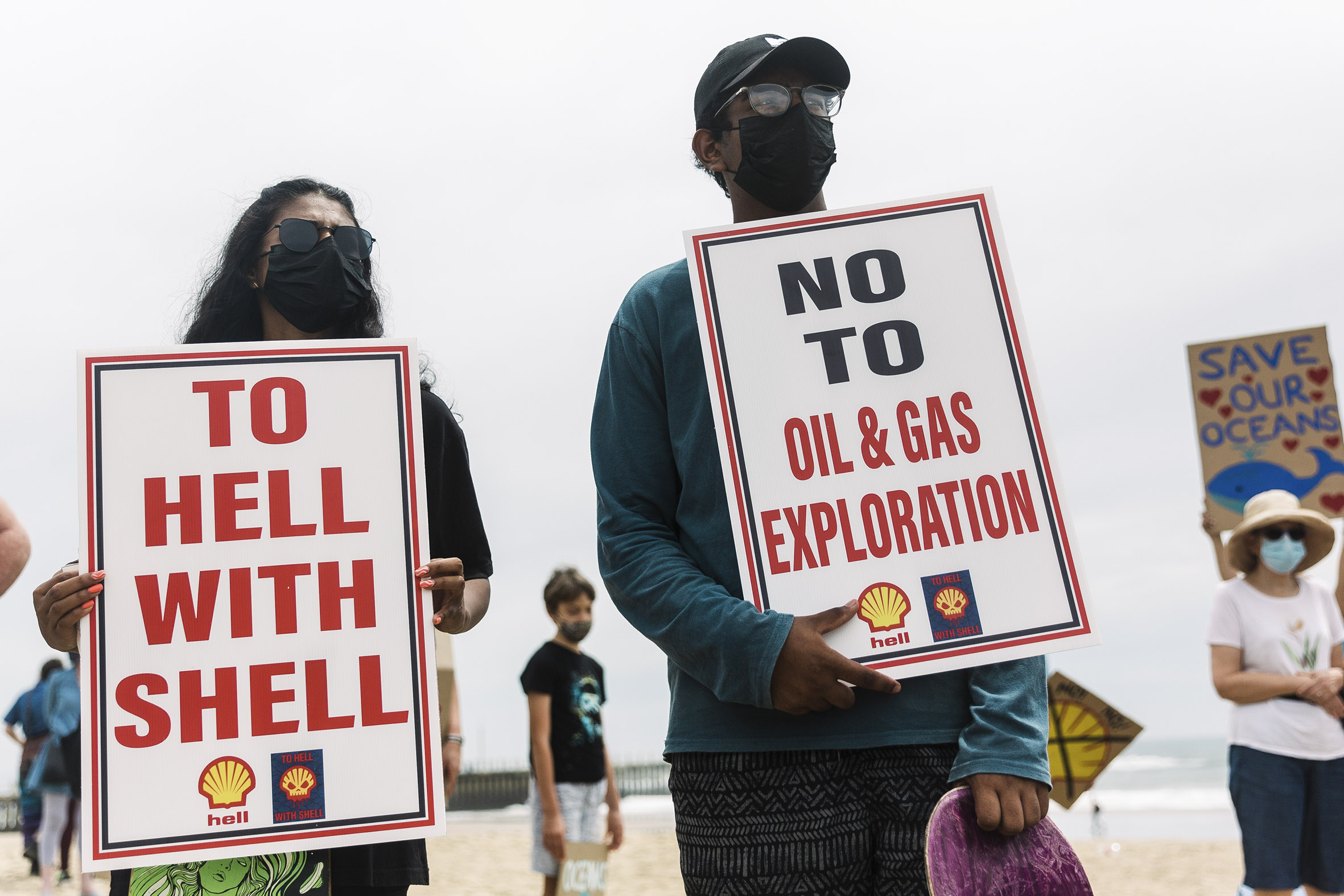South Africa’s government is stuck on oil and gas
The energy minister continues to sing the same old song. More concerning is the petroleum agency’s authoritarian stance despite the environmental issues being interrogated in court.
Author:
15 March 2022

Minister of Mineral Resources and Energy Gwede Mantashe used the National Energy Dialogue to champion fossil fuels and advocate for the exploitation of oil and gas. At the event co-hosted by the Central Energy Fund, Mkokeli Advisory and the Financial Mail, Mantashe claimed that in promoting oil and gas he was “standing up for development” in South Africa.
Given the recent revelation that the ANC received R15 million from the Batho Batho Trust, which has a 28% interest in Shell’s downstream business in South Africa, the minister also appears to have been standing up for the development of the ANC’s election fund.
Mantashe expressed his frustration at recent court actions that have halted oil and gas exploration in South Africa’s oceans. He said there needs to be “discussion” about how to balance “nature” and “development”, noting that South Africa has yet to get that “balance right”. The irony of saying that this issue needs to be discussed, when these are precisely the issues being interrogated before the courts, appeared to escape the minister.
Mantashe’s comments were tediously predictable. What should have grabbed everyone’s attention at the event were the deeply concerning authoritarian comments made by Petroleum Agency of South Africa (Pasa) chief executive Phindile Masangane.
Related article:
Pasa is the government agency responsible for promoting and regulating the “exploration for onshore and offshore oil and gas resources and their optimal development on behalf of government”. Notwithstanding the obvious conflict of interest between promotion and regulation, Pasa’s most recent annual report nonetheless notes that one of its tasks is to protect and fulfil Section 24 of the Constitution. This says, among other things, that all South Africans have the right “to an environment that is not harmful to their health or wellbeing”.
But despite this being one of Pasa’s roles, in an extraordinary outburst at the event Masangane lamented the “fundamentalist attacks on government energy policy” that have ended up in the courts – an obvious reference to the ongoing litigation around the exploration of oil and gas. Referring directly to the Constitution, she described the ability of South Africans to take the decisions of government departments and regulators to court as “the weakness in our system”.
She said she prefers the system in Namibia, where court challenges to the regulator cannot pass the high court. This means they are not subject to appeal in higher courts as they are in South Africa.
Masangane doubled down on this point by referring to Angola. She noted that the final decision in terms of environmental authorisations rests exclusively with the Angolan petroleum regulator, resulting in environmental authorisations being given in six months rather than being an “open-ended process” like in South Africa. Journalist Xolani Mbanjwa, who was chairing the session, responded pointedly: “I like the South African setup, I like the room for recourse. I will choose South African democracy and its legal framework over Angola.” And he is absolutely right to do so.
Unaware or don’t care?
Perhaps Masangane is unaware of the decades of brutal state repression that have taken place in Angola’s oil-rich Cabinda province. Perhaps she is unaware of Human Rights Watch’s 2021 assertion that “authorities have … struggled to contain abuses by state security forces implicated in killings and excessive use of force” in Angola. She can’t have read Amnesty International’s recent assessment that “authorities continued to repress the rights to freedom of expression, association and peaceful assembly in Cabinda province. Political activists and human rights defenders were harassed, beaten and arbitrarily detained.” Then there were the Luanda Leaks in 2020, which showed how 20 years of state corruption in Angola’s oil and diamond sectors drained billions of dollars from one of the world’s poorest countries.
Let’s also assume she doesn’t know that Freedom House rates Angola in 2021 as “not free”, scoring it 10 out of 40 for “political liberties” and 21 out of 60 for civil liberties. If Masangane is aware of these facts, one can only wonder what kind of authoritarian vision she has for South Africa, circled as it is at present by multinational oil and gas companies looking to exploit its resources.
Related article:
Before singing the praises of oil and gas, Mantashe and Masangane would do well to address the genuine and reasoned concerns appearing before the courts. Environmentalists and community members are worried about the continued extraction of fossil fuel in the face of the climate emergency, and Mantashe and Masangane should listen to them rather than look to silence them. They should acquaint themselves with last month’s report from the Intergovernmental Panel on Climate Change, which led United Nations secretary general Antonio Guterres to conclude that “unchecked carbon pollution is forcing the world’s most vulnerable on a frogmarch to destruction … the facts are undeniable”.
They should also acquaint themselves with the concept of the resource curse. It has a long history, globally and especially in Africa, and provides scant evidence that exploiting petroleum resources benefits anybody other than the few greedy elite – such as Isabel dos Santos in Angola – who slavishly align themselves with overseas fossil fuel interests.


